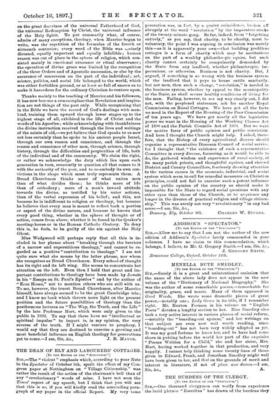THE DEAN OF ELY AND LABOURERS' COTTAGES. [ro THE EDITOR
Or THE "SPECTATOR."]
SIR,—The " violent " emphasis which, according to your Note in the Spectator of October 9th, spoilt the effect of my Con- gress paper at Nottingham on "Village Citizenship," was rather the result of the action of the chairman's bell than of any " revolutionary " words of mine. I have not seen the Times' report of my speech, but I think that you will see that this is so, if you will kindly read the concluding para- graph of my paper in the official Report. My very tame
peroration was, in bet, by a quaint coincidence, broken off abruptly at the word " revolution " by the imperative stroke of the twenty-minute gong. So far, indeed, from " forgetting entirely," as you say, that charity, to be charity, must be voluntary, the point I was arguing in conclusion was merely this —as it is apparently your own—that building profitless cottages is a form of charity which may be meritorious on the part of a wealthy philanthropic squire, but such charity cannot certainly be compulsorily demanded by the State from any landlord, whether philanthropic, im- pecunious, or otherwise. Business is not charity. But, I argued, if something is so wrong with the business system of the landlord that it pays to house cattle sanitarily, but not men, then such a. change, "revolution," is needed in the business system, whether by appeal to the municipality or the State, as shall secure healthy conditions of living for the men. Failing, however, to see my way clearly out, I did not, with the perplexed statesman, ask for another Royal Commission on Rural Cottages. We have got all the facts we need in the Report of the Housing of the Poor Commission of ten years ago. We have got nearly all the legislative power we want in the Housing of the Working Classes Act of 1890 and the Parish Councils Act of 1894. But we want the motive force of public opinion and public conviction. And here I thought the Church might help. I asked, there- fore, that the Bishop of every agricultural diocese should organise a representative Diocesan Council of social service, for I thought that: " the existence of such a representative Committee in every diocese, focussing, as it would be able to do, the gathered wisdom and experience of rural society, of its many parish priests, and thoughtful squires, and shrewd District and County Councillors, fearlessly drawing attention to the various causes in the economic, industrial, and social system which seem to call for remedial measures on Christian principles, could not fail to exercise such a potent influence on the public opinion of the country as should make it impossible for the State to regard social questions with any other eyes than those of the Church, or to acquiesce any longer in the divorce of practical religion and village citizen- ship." This was surely not very " revolutionary " in any bad sense.—I am. Sir, &c.,






































 Previous page
Previous page